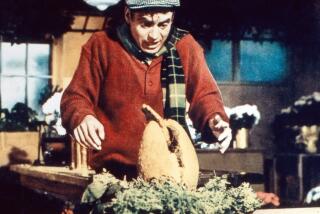A Man of Substance Who Made Valuable Films That ‘Worked’
- Share via
Note: Producer-director Alan J. Pakula died Thursday in an automobile accident in New York. The 70-year-old Pakula is best known for films he directed--”All the President’s Men,” “Sophie’s Choice” and “Klute”--and for “To Kill a Mockingbird,” which he produced. The following is an appreciation of his work.
*
Perhaps the most common complaint of the contemporary moviegoer is how many films are either popcorn-munching pap or obscure objects of auteurist thumb-sucking--how few, in other words, are about something substantial, without forgetting why we’ve come to the theater, or why we stay.
Alan J. Pakula’s body of work-- smaller than Alfred Hitchcock’s or Sydney Lumet’s, to name two directors with whom he shared certain kinships--nonetheless comprises a monument to their times. And to their maker: They reveal a director and producer whose box-office savvy never precluded his desire for substance, and whose political and social conscience never kept him from making a movie that, as they say, “worked.”
For example: “All the President’s Men” (1976), perhaps his most famous movie, was a political expose crossed with film noir that made ample use of its two glamorous stars (Dustin Hoffman and Robert Redford), but never forgot that it was about a nation teetering on the brink of constitutional crisis. Likewise “The Parallax View” (1974), which possessed the streak of political paranoia that runs through so much of Pakula’s work, but also showed a seemingly innate sense of what to do with someone like Warren Beatty.
He began his career--after a stint in the cartoon department at Warner Bros.--producing the films of Robert Mulligan, which included “Fear Strikes Out” (1957), “To Kill a Mockingbird” (1962), “Love With the Proper Stranger” (1963), “Baby, the Rain Must Fall” (1964) and “Inside Daisy Clover” (1965). “Mockingbird,” particularly, remains a classic example of what Hollywood was, and is, capable of doing, morally, artistically and commercially.
His directing career began in 1969 with “The Sterile Cuckoo” (or “Pookie”) starring Liza Minnelli, and in both that film and 1972’s “Love and Pain and the Whole Damn Thing” (which featured Maggie Smith playing a terminally ill woman), he mined the plight of the wounded for a depth of pathos that’s seldom been attempted.
It was a far cry from the film that really put him on the map: “Klute” (1971), which won Jane Fonda her first Oscar playing the hooker with the hard-shell finish, and was a profoundly disturbing film--not just for its sordid subject matter, but its cynical edge.
Pakula reunited with Fonda for “Comes a Horseman” (1978) and “Rollover” (1981), an unsuccessful film that was nonetheless prescient about world finance.
But it was another actress who provided his next and some would say final, great success: “Sophie’s Choice,” which combined William Styron’s novel, Pakula’s dramatic powers and those of Meryl Streep at her protean peak for one of the great films of the ‘80s.
In his last years, Pakula’s output included “Presumed Innocent” (1990), “The Pelican Brief” (1993) and “The Devil’s Own” (1997), all of which, even at the most pulp-inspired and occasionally hysterical still showed a desire to make a statement about the world around him, without sacrificing entertainment.
This two-pronged attack seemed to be a kind of ethos for Alan J. Pakula. It was also a neat trick, one this director could pull off as well as any other.
More to Read
Only good movies
Get the Indie Focus newsletter, Mark Olsen's weekly guide to the world of cinema.
You may occasionally receive promotional content from the Los Angeles Times.









